High-Speed, Low-Profile Motorized XY Scanning Stages
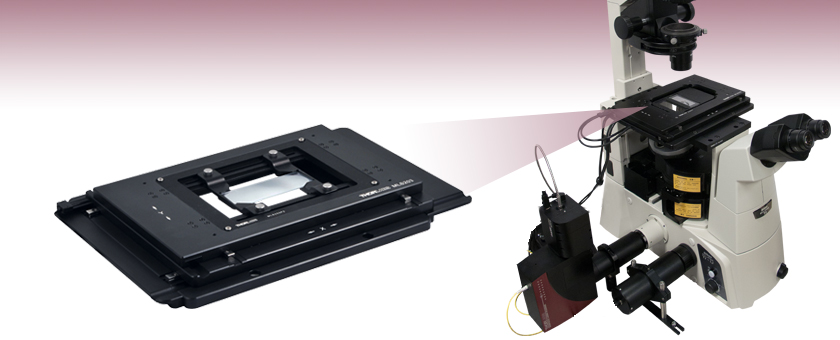
- Ultra Fast XY Scanning Up to 250 mm/s
- Low-Profile, Compact Footprint
- Compatible with Thorlabs' Cerna®, Nikon,
Olympus, and Zeiss Microscopes
MLS203-1 Stage Shown Mounted to a Nikon
Eclipse Ti-U Microscope Equipped
with Thorlabs' Confocal Imaging System
MLS203-1
Shown with MLS203P2 Slide Holder
Stage Dimensions: 260 mm x 230 mm x 31 mm

Please Wait
Features
- Integrates with Nikon, Olympus, Zeiss, and Thorlabs' Cerna® Upright and Inverted Microscopes
- Compact Design with Easy Sample Access
- Range of Sample Holders Available
- Integrated Brushless DC Linear Servo Motor Actuators
- Linear Optical Encoders
- High-Quality, Precision-Engineered Linear Bearings
- High Repeatability (0.25 µm) and Position Accuracy (<3 µm)
- Compatible with Thorlabs' Kinesis® Software
Thorlabs' MLS203 stages have been designed as drop-in replacements for the manual stages found on select Nikon, Olympus, Zeiss, and Cerna® microscopes to provide motorized XY positioning of microscopy samples. A complete stage package consists of the stage itself, a controller, mounting brackets, and optional accessories; all of these items need to be purchased separately. The table below outlines the items that should be purchased to form a stage package compatible with a particular microscope. Alternatively, optional mounting adapters enable a stage to be bolted to an optical table or breadboard as part of a custom-built microscope setup or for use in typical photonics applications.
Characterized by high-speed scanning capabilities and high positional accuracy, these compact stages are ideal for manually or automatically positioning a wide range of specimens and samples in many types of microscopy or imaging techniques and applications. Very precise manual fine positioning and control at the cellular level is easily achieved through the combination of a stable closed-loop control system and an associated joystick option. In addition, the stages can be combined with our Z-Axis Piezo Stage to form an XYZ stage ideally suited for laser scanning microscopy. For applications where high-speed is not required, Thorlabs offers a Low-Profile Motorized XY Microscopy Stage that is also compatible with Nikon, Olympus, and Thorlabs Cerna microscopes (see table below).
The motorized stage technology is covered by US patent 8,575,792.
Controller Option
The recommended controller for the MLS203 stage is the BBD302 Dual-Axis Brushless DC Motor Controller, which is compatible with our Kinesis software suite. See below for a brief overview, or click here to view the full presentation for this controller. This stage can also be controlled by our MBD602 Rackmount Control Module designed for use with the MMR60x Motion Control 19" Modular Rack System.
Specimen Holders and Accessories
We offer a range of adapters to allow the positioning of standard microscope slides, multiwell plates, petri dishes, and mounted metallurgical specimens. Please see the details below.
Complete Microscope Stage Assemblies
| Microscopea | XY Scanning Stage / Controller | Mounting Bracket | Optional Specimen Holders and Accessories |
|---|---|---|---|
| Thorlabs Cerna | MLS203-1 Stageb / BBD302 Controller | CSA1000 | MLS203P1: Multiwell Plate Adapter MLS203P2: Petri Dish / Slide Holder for Inverted Microscopes C4SH01: Multi Slide Holder for Inverted Microscopes MLS203P3: Blank Adapter Plate MLS203P5: 1/4"-20 Tapped Breadboard Plate MLS203P4: M6-Tapped Breadboard Plate MLS203P10 & MLS203P13: Multiple Slide Holders for Upright and Inverted Microscopes MJC2: 2-Axis Microscopy Joystick |
| Nikon 50i, 80i, 90i, and Ci-L | MLSA06 | ||
| Nikon TE2000 and Eclipse Ti | MLSA03 | ||
| Nikon Eclipse FN1 | MLSA07 | ||
| Olympus BX41, BX43, BX51, BX53, and BX61 | MLSA08 | ||
| Olympus IX51, IX71, IX73, IX81, and IX83 | MLSA02 | ||
| Olympus IX70 | MLSA09 | ||
| Zeiss Axio Observer and Axiovert 40 | MLS203-2 / BBD302 Controller | None Needed | |
| Optical Breadboard / Custom Configuration | MLS203-1 Stageb / BBD302 Controller | MLSA01 or MLSA04 | |
| MLS203-2 / BBD302 Controller | MLSA04 |
| MLS203 Stage | |
|---|---|
| Travel Range | 110 mm x 75 mm (4.33" x 2.95") |
| Speed (Max) | 250 mm/s |
| Acceleration (Max) | 2000 mm/s2 |
| Bidirectional Repeatability | 0.25 µm |
| Unidirectional Repeatability | 0.25 µm |
| Backlasha | N/A |
| Load Capacity (Max)b | 1 kg (2.2 lb) |
| Incremental Movement (Min) | 0.1 µm |
| Absolute On-Axis Accuracy | <3 µm |
| Percentage Accuracy (Max) | X-Axis: 0.0027% Y-Axis: 0.004% |
| Flatness in X Axis | ±3 µm Over Full Travel, ±1 µm Over 10 mm |
| Flatness in Y Axis | ±2 µm Over Full Travel, ±1 µm Over 10 mm |
| Home Location Accuracy | 0.25 µm |
| Settling Time within 1 µm (600 g Load) | 0.1 s |
| Settling Time within 0.1 µm (600 g Load) | 0.6 s |
| Weight (Including Cables) | 3.2 kg (7.0 lbs) |
| Limit Switches | X and Y as Standard |
| Bearing Type | Precision Linear Bearing |
| Motor Type | Brushless DC Linear Motor |
| Dimensions (Mid Travel, Excluding Guards) | 260.0 mm x 230.0 mm x 31.3 mm (10.24" x 9.06" x 1.23") |
| Recommended Controller | BBD302 |
| BBD302 Controller | |
|---|---|
| Number of Channels | 2 |
| Drive Connector | 8 Pin DIN, Round, Female |
| Feedback Connector | 15-Pin D-Type, Female |
| Brushless Continuous Output | 2.5 A per Channel, 5 A Max All-Channel Total Output |
| Brushless Peak Output | 4.0 A per Channel, 5 A Max All-Channel Total Output |
| PWM Frequency | 40 kHz |
| Operating Modes | Position and Velocity |
| Control Algorithm | 16-Bit Digital PID Servo Loop with Velocity and Acceleration Feedforward |
| Velocity Profile | Trapezoidal/S-Curve |
| Position Count | 32 Bit |
| Position Feedback | Incremental Encoder |
| Encoder Bandwidth | 2.5 MHz (10 M Counts/sec) |
| Encoder Supply | 5 V |
| AUX Control Connector | 37-Pin D-Type Female (User Digital IO, 5 V O/P) |
| Front Panel Display | 4.3" Full-Color LCD, 480 x 272 Pixels |
| Input Power Requirements |
250 VA Voltage: 100 to 240 VAC Frequency: 47 to 63 Hz Fuse: 3.15 A |
| Dimensions (W x D x H) | 250.0 mm x 279.1 mm x 108.8 mm (9.84" x 10.99" x 4.28") |
| Mass (Weight) | 1.70 kg (3.75 lbs) |
MLS203 XY Scanning Stage Pin Out Descriptions
The flying leads are terminated in a male 15-pin D-Type and male 8-pin round DIN connector. Pin details are given below.
Feedback Connector

Motor Drive Connector
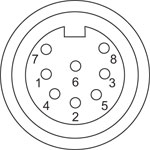
| Pin | Description | Pin | Description |
|---|---|---|---|
| 1 | Not Used | 9 | Ground |
| 2 | Ground | 10 | Limit Switch + |
| 3 | Not Used | 11 | Limit Switch - |
| 4 | Enc Index - | 12 | Enc Index + |
| 5 | QB - | 13 | QB + |
| 6 | QA - | 14 | QA + |
| 7a | 5 V | 15 | Not Used |
| 8a | 5 V |
| Pin | Description | Pin | Description |
|---|---|---|---|
| 1 | Motor Phase B | 5 | Stage ID |
| 2 | GND | 6 | Enable |
| 3a | Unused (Motor Phase D) | 7 | Motor Phase C |
| 4 | Motor Phase A | 8a | +5 V |
BBD302 Controller Pin Out Descriptions
MOTOR DRIVE
Female DIN Connector
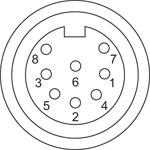
| Pin | Description | Pin | Description |
|---|---|---|---|
| 1 | Motor Phase B | 5 | Stage ID |
| 2 | GND | 6 | Enable |
| 3a | Unused (Motor Phase D) | 7 | Motor Phase C |
| 4 | Motor Phase A | 8a | +5 V |
FEEDBACK
Female D-Type Connector

| Pin | Description | Pin | Description |
|---|---|---|---|
| 1 | Not Connected | 9 | GND |
| 2 | GND | 10 | Limit Switch + |
| 3 | Not Connected | 11 | Limit Switch - |
| 4 | Index - | 12 | Index + |
| 5 | QB - | 13 | QB + |
| 6 | QA - | 14 | QA + |
| 7a | 5 V | 15 | Not Connected |
| 8a | 5 V |
HANDSET
Female Mini DIN Connector
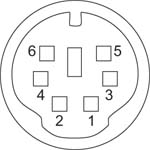
| Pin | Description | Pin | Description |
|---|---|---|---|
| 1 | RX (Controller Input) |
4 | Supply Voltage for Handset 5 V |
| 2 | Ground | 5 | TX (Controller Output) |
| 3 | Ground | 6 | Ground |
AUX I/O
Female D-Type Connector

| Pin | Description | Pin | Description | Pin | Description | Pin | Description |
|---|---|---|---|---|---|---|---|
| 1 | RS232 TX | 11 | User Digital O/P 11+ | 21 | +5 V | 31 | User Digital O/P 4+ |
| 2 | RS232 RX | 12 | User Digital O/P 10- | 22 | User Digital I/P 3 | 32 | User Digital O/P 4- |
| 3 | Ground | 13 | User Digital O/P 10+ | 23 | User Digital I/P 2 | 33 | User Digital O/P 5+ |
| 4 | Differential I/P 2+ | 14 | User Digital O/P 9- | 24 | User Digital I/P 1 | 34 | User Digital O/P 5- |
| 5 | Differential I/P 2- | 15 | User Digital O/P 9+ | 25 | User Digital I/P 0 | 35 | User Digital O/P 6+ |
| 6 | Differential I/P 1- | 16 | User Digital O/P 8- | 26 | User Digital O/P 0 | 36 | User Digital O/P 6- |
| 7 | Differential I/P 1+ | 17 | User Digital O/P 8+ | 27 | User Digital O/P 1 | 37 | Ground |
| 8 | User Digital O/P 12- | 18 | User Digital O/P 7- | 28 | User Digital O/P 2 | - | - |
| 9 | User Digital O/P 12+ | 19 | User Digital O/P 7+ | 29 | User Digital O/P 3 | ||
| 10 | User Digital O/P 11- | 20 | +5 V | 30 | Ground |
USB
Type B USB Female
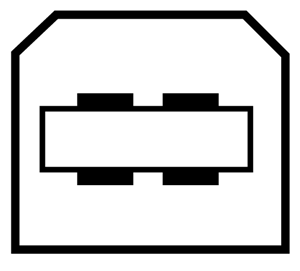
I/O
Female BNC Connector
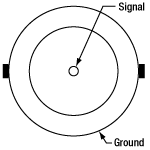
5 V TTL
Software
Kinesis Version 1.14.50
The Kinesis Software Package, which includes a GUI for control of Thorlabs' Kinesis system controllers.
Also Available:
- Communications Protocol
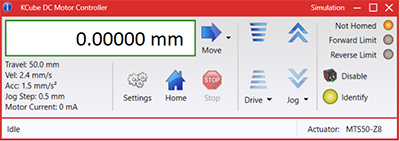
Kinesis GUI Screen
Thorlabs offers the Kinesis® software package to drive our wide range of motion controllers. The software can be used to control devices in the Kinesis family, which covers a wide variety of motion controllers ranging from small, low-powered, single-channel drivers (such as the K-Cubes™) to high-power, multi-channel benchtop units and modular 19" rack nanopositioning systems (the MMR60x Rack System).
The Kinesis Software features .NET controls which can be used by 3rd party developers working in the latest C#, Visual Basic, LabVIEW™, or any .NET compatible languages to create custom applications. Low-level DLL libraries are included for applications not expected to use the .NET framework and APIs are included with each install. A Central Sequence Manager supports integration and synchronization of all Thorlabs motion control hardware.
By providing this common software platform, Thorlabs has ensured that users can mix and match any of our motion control devices in a single application, while only having to learn a single set of software tools. In this way, it is perfectly feasible to combine any of the controllers from single-axis to multi-axis systems and control all from a single, PC-based unified software interface.
The software package allows two methods of usage: graphical user interface (GUI) utilities for direct interaction with and control of the controllers 'out of the box', and a set of programming interfaces that allow custom-integrated positioning and alignment solutions to be easily programmed in the development language of choice.
Legacy Software
Select products are still capable of running the legacy APT™ software package. Information on software compatibility can be found in the product documentation (![]() ), and additional details about the APT software can be found here.
), and additional details about the APT software can be found here.
Thorlabs' Kinesis® software features new .NET controls which can be used by third-party developers working in the latest C#, Visual Basic, LabVIEW™, or any .NET compatible languages to create custom applications.
C#
This programming language is designed to allow multiple programming paradigms, or languages, to be used, thus allowing for complex problems to be solved in an easy or efficient manner. It encompasses typing, imperative, declarative, functional, generic, object-oriented, and component-oriented programming. By providing functionality with this common software platform, Thorlabs has ensured that users can easily mix and match any of the Kinesis controllers in a single application, while only having to learn a single set of software tools. In this way, it is perfectly feasible to combine any of the controllers from the low-powered, single-axis to the high-powered, multi-axis systems and control all from a single, PC-based unified software interface.
The Kinesis System Software allows two methods of usage: graphical user interface (GUI) utilities for direct interaction and control of the controllers 'out of the box', and a set of programming interfaces that allow custom-integrated positioning and alignment solutions to be easily programmed in the development language of choice.
For a collection of example projects that can be compiled and run to demonstrate the different ways in which developers can build on the Kinesis motion control libraries, click on the links below. Please note that a separate integrated development environment (IDE) (e.g., Microsoft Visual Studio) will be required to execute the Quick Start examples. The C# example projects can be executed using the included .NET controls in the Kinesis software package (see the Kinesis Software tab for details).
 |
Click Here for the Kinesis with C# Quick Start Guide Click Here for C# Example Projects Click Here for Quick Start Device Control Examples |
 |
LabVIEW
LabVIEW can be used to communicate with any Kinesis- or APT-based controller via .NET controls. In LabVIEW, you build a user interface, known as a front panel, with a set of tools and objects and then add code using graphical representations of functions to control the front panel objects. The LabVIEW tutorial, provided below, provides some information on using the .NET controls to create control GUIs for Kinesis- and APT-driven devices within LabVIEW. It includes an overview with basic information about using controllers in LabVIEW and explains the setup procedure that needs to be completed before using a LabVIEW GUI to operate a device.
 |
Click Here to View the LabVIEW Guide Click Here to View the Kinesis with LabVIEW Overview Page |
 |
| Posted Comments: | |
user
(posted 2023-09-11 15:07:02.263) Hi, could you update the STEP file for MLS203-1? The current file is missing some of the mounting holes. Thanks! do'neill
(posted 2023-09-12 04:54:19.0) Daniel O Neill: Response from Daniel at Thorlabs. I have let our web team know about this and they are looking into this and this should be sorted shortly. Huiwang Ai
(posted 2023-07-14 23:33:07.88) Can this stage be made compatible with the Leica DMI4000B microscope? fguzman
(posted 2023-07-19 09:21:43.0) Thank you for enquiry and interest in our microscope stages.
There are no adapters specifically made for Leica, but it is likely that one of the existing ones could fit. The problem for us, when it comes to external microscopes, is that we have very small possibilities to know if they will fit. We provide drawings and solid-works models for all our adapters; they are available on the webpage. If you have any more questions please contact techsupport@thorlabs.com Oscar Gomez Calderon
(posted 2023-01-12 10:35:18.85) We would like to ask you a question about the multiwell plate adapter MLS203P1. We are using our 96-well plates (e.g. from biomat or Nunc TM) but we are not able to properly fit them. They can still be moved. Could you please help us?
Sincerely yours
Oscar JReeder
(posted 2023-01-20 06:32:49.0) Thank you for your enquiry. The MLS203P1 should be compatible with standard size well plates. I have reached out to you to assist with this. Oscar Gómez Calderón
(posted 2022-09-29 22:15:59.333) We have just acquired the high-speed motorized XY Scanning Stage MLS203-1 with the controller BBD302. We are planning to use it with Labview (LabView 2011 32 bit). We have instaled the Kinesis software (32 bit) and followed the Kinesis LabView Guide. When we tried to insert the Kinesis .NET control assembly we got the following error: System.BadImageFormatException: cannot load file or assembly "..... Thorlabs.MotionControl.Benchtop.BruslessMotor.dll" the assembly is expected to have an assembly manifest.
Could you please help us?
Best regards
Oscar cwright
(posted 2022-10-03 09:59:34.0) Response from Charles at Thorlabs: thank you for your query. This is often seen when using 32 bit LabVIEW on 64 bit Windows and trying to use the 32 bit Kinesis dlls instead of the 32 for 64 bit dlls. Tigrane Cantat-Moltrecht
(posted 2022-03-03 15:19:39.8) Hello,
upon powering up the BBD203 controller, at the initialization of the X and Y channels, each channel seems to suffer a sudden "jolt", like a violent but very short movement. I witness this at every turning on on two different stage+controller pair. Is this behaviour normal/to be expected ?
Also on a few occasions, at this stage the controller seemed to be forcing the channels with series of these "jolts" and was unable to complete initialization. Could you help with this ?
Thanks,
Tigrane CM cwright
(posted 2022-03-04 06:37:54.0) Response from Charles at Thorlabs: Thank you for contacting us. The stage must go through a startup process called phase initialisation. The controller is energising the coils and measuring the resulting movement. This means that on power up, the stage may make a slight buzzing noise and move about randomly for a few seconds. This is likely what you are experiencing. Phase initialisation cannot coomplete if there is an obstruction to this movement or there is dust on an encoder. A member of technical support will contact you. You local technical support can also be contacted directly using the contact details here: https://www.thorlabs.de/locations.cfm Jie Chen
(posted 2021-02-24 14:47:05.423) I want to write some codes to control the BBD203 controller. Is there any example code to give me an assistance? Thank you! DJayasuriya
(posted 2021-02-25 10:06:15.0) Thank you for your inquiry. I Will get in touch with you directly to assist you. DJayasuriya
(posted 2021-02-25 10:06:15.0) Thank you for your inquiry. I Will get in touch with you directly to assist you. Dohyun Kim
(posted 2021-02-22 16:09:02.06) Dear Thorlab
I am an associate professor in the Department of Mechanical Engineering, Myongji University, South Korea.
I am highly interested in your high-speed XY stage. I would like to use this stage on my IX-70 microscope for fluorescence imaing. My question is:
Can this stage move 0.5 mm distance +X and -X directions 5 times per second with this stage?
In theory, it seems possible considering it would only take 0.5mm/(250 mm/s)= 2 ms but i guess one has to consider acceleration and deceleration.
Regards, YLohia
(posted 2021-02-22 11:41:04.0) Thank you for contacting Thorlabs. Yes, this is possible. Please see the acceleration (and deceleration) times as a function of load (> 500 mm/s²) listed on page 11 of the manual: https://www.thorlabs.com/_sd.cfm?fileName=20967-D02.pdf&partNumber=MLS203-1 Christian Maibohm
(posted 2020-08-04 05:49:07.99) Dear Thorlabs,
Is it possible to run the MLS203-1 stage with micro-manger?
I can see in a question below that this stage is not recommended to operate in an incubator environment. Does this also apply to a stage-top incubator system such as the OKO-lab uno or similar systems?
Thank you in advance, Christian Maibohm DJayasuriya
(posted 2020-08-07 06:41:42.0) Thank you for your inquiry. Yes it is possible to use mirco-manager with the MLS stage. I will get in touch with you to send a general comments guide. We have worked with Tokai-Hit for stage-top incubators and they proved successful. tobias.meyer
(posted 2018-01-08 10:37:18.78) Hi, I have purchased the stage in order to use it with a thorlabs resonant LSM (which is not sold any more, the res. LSM with 4 channels detection). How do I integrate the stage with ThorimageLS? It does not automatically detect the stage. I have installed it and it runs, but I would prefer to move it through Thorimage. Can you help me with that?
Thank you very much,
Tobias bwood
(posted 2018-02-05 04:12:17.0) Response from Ben at Thorlabs: Thank you for your question. I will be in contact with you directly to discuss using the MLS203-1 with ThorimageLS. patrick.lu
(posted 2015-02-27 15:59:48.293) Sorry to clutter the thread, but we would also like the documentation for the low level serial communication. While we expect to use the ActiveX approach, I would like to explore both options. msoulby
(posted 2015-03-02 04:00:35.0) Response from Mike at Thorlabs: The low level communications protocols can be freely downloaded from the following link http://www.thorlabs.de/software/apt/APT_Communications_Protocol_Rev_14.pdf however we will also send this document to you directly. patrick.lu
(posted 2014-12-12 20:15:43.15) Is it possible to add a hardware limit switch to the stage? For instance, in our space-constrained setup, we will have collisions if the stage is allowed to move through its full 110mm range along the x-axis. We would rather limit it to 75mm of travel. Since we are planning to control the stage using LabVIEW, this will be possible in software, but I think for peace of mind it would be nice to constrain it through hardware as well. msoulby
(posted 2014-12-15 06:55:10.0) Response from Mike at Thorlabs: The stage does have hardware limit switches at the extremes of travel to prevent the stage from driving into the edge as you would expect, however it is not possible to add a hardware limit switch in the middle of the travel. Therefore using a software platform such as Labview to implement a travel restriction is currently the only option that is currently feasible with the MLS203-1 rauer
(posted 2014-09-19 15:39:13.903) Is there a different way to programmtically (in C#) control this stage than using an activex control? msoulby
(posted 2014-09-22 03:26:21.0) Reponses from Mike at Thorlabs: If you do not wish to use ActiveX one other option would be to make use of direct serial communication through a virtual COM port on the USB. We have documented all of the low level communications protocols that can be used with our controllers and have emailed you directly with this document and some brief instructions on using the protocols. jaz22
(posted 2014-07-25 15:17:16.22) Can this stage also be mounted vertically if I would like to use it for an application other than microscopy? msoulby
(posted 2014-07-29 04:46:23.0) Response from Mike at Thorlabs: The brushless DC motors in the MLS203 cannot be used in a vertical configuration. The stage would be able to operate vertically however as soon as the power is removed there is no braking on the moving world. The stage will fall rapidly to the bottom. This shock of the moving world and load hitting the end of the stage can potentially cause damage to the stage. You would need to use a lead screw driven stage for vertical configurations, for example the MTS50 or LNR50S. yatang32
(posted 2014-06-23 14:24:33.647) If I want to use Labview to program MLS203-1, can I do it with
the controller? bhallewell
(posted 2014-06-23 06:14:39.0) Response from Ben at Thorlabs: Yes, you can! Our recommended BBD202 series controller can be controlled through LabVIEW. By installing our readily available APT Motion Control Software from the following link you can connect with ActiveX controls through LabVIEW to control the MLS203 stage. Please find support documentation available here also for guidance.
http://www.thorlabs.de/software_pages/ViewSoftwarePage.cfm?Code=APT
We have recently updated our software to be comptaible with both 64-bit & 32-bit versions of LabVIEW. user
(posted 2013-10-24 03:34:27.663) Dear Mr/Ms
I'm Jaeduck Jang from Korea.
According to the specs of MLS203-1, it can be adopted to IX71,81 Olympus Microscopes. As I know recent Olympus inverted microscopes are IX73 and 83. Should I use MSL203-1 with MLSA02 on IX83 platform? msoulby
(posted 2013-11-21 11:31:33.0) Response from Mike at Thorlabs: Yes, the MLSA02 and MLS201-1 can be used with the Olympus IX83 cj
(posted 2013-02-13 12:47:11.367) Can I mount a heating insert onto this device? The link below is the insert I plan on using. http://www.pecon.biz/?page_id=765
Also is this device capable of with standing the hot/humid environment in an incubation chamber? jlow
(posted 2013-02-18 11:56:00.0) Response from Jeremy at Thorlabs: We do not have specific operating temperature specs for this but the recommended temperature is <40°C. This device is not meant to be operated in a high humidity environment so I would NOT recommend using this in an incubation chamber. user
(posted 2013-02-13 20:40:54.45) Is MLS203-1 High speed motorized scanning stage controllable with Cellsens software from Olympus? jlow
(posted 2013-02-18 11:53:00.0) Response from Jeremy at Thorlabs: Unfortunately the MLS203-1 is not compatible with Cellsens software from Olympus. It can be used in micromanager which is another popular microscopy suite. If you are interested in this, please let us know and we can send you details on the setup procedure. bdada
(posted 2012-04-23 17:47:00.0) Response from Buki at Thorlabs to david:
Thank you for your feedback. We only recommend that the MLS and other brushless stages are used with Thorlabs controllers because we cannot guarantee safe use with 3rd party controllers. Please consider using our BBD102 controller shown in the page linked below:
http://www.thorlabs.de/newgrouppage9.cfm?objectgroup_id=5360
We have contacted you to discuss this further. david.naylor
(posted 2012-04-19 06:20:42.0) Hi,
I would like to use existing aerotech soloist controllers that we have http://www.aerotech.com/product-catalog/drives-and-drive-racks/soloist-mp.aspx
to drive each axis of the MLS203-1.
Could you tell me if you foresee any problems with this configuration.
Thanks
David tcohen
(posted 2012-03-08 12:30:00.0) Response from Tim at Thorlabs: Thank you for your feedback. Yes, the stage can be used in µManager. You should be able to select the stage from the list of available devices in µManager when setting up the hardware configuration. user
(posted 2012-03-08 08:06:39.0) Compatible with µManager ? |

| Key Specificationsa | |
|---|---|
| Travel Range | 110 mm x 75 mm (4.33" x 2.95") |
| Velocity (Max) | 250 mm/s |
| Acceleration (Max) | 2000 mm/s2 |
| Bidirectional Repeatability | 0.25 µm |
| Unidirectional Repeatability | 0.25 µm |
| Horizontal Load Capacity (Max)b | 1.0 kg (2.2 lb) |
| Min. Achievable Incremental Movement | 0.1 µm |
| Home Location Accuracy | 0.25 µm |
| Absolute On-Axis Accuracy | <3 µm |
These compact XY scanning stages are drop-in replacements for the manual stages found on select microscopes and provide motorized XY positioning of microscopy samples. The MLS203-1 is compatible with Thorlabs' Cerna® microscopes, as well as inverted and upright microscopes from Nikon and Olympus (see the table in the Overview tab above). Adapter brackets can be purchased separately that enable the stage to be fitted to a particular microscope. Tabletop mounting adapters are also available that enable the stage to be bolted to an optical table or breadboard as part of a custom-built microscope setup or for use in typical photonics applications (see below for more details).
The MLS203-2 is directly compatible with Zeiss Axio Observer and Axiovert 40 microscopes. Mounting brackets are not required.

The BBD302 two-channel controller features Thorlabs' Kinesis® control and programming interface, enabling easy integration into automated microscopy applications. It is ideal for applications demanding operation at high speeds (hundreds of mm/s) and high encoder resolution (<100 nm). For greater flexibility, communication with a PC is supported using either a USB or RS232 serial interface. The controller is supplied with a software development kit (SDK) in order to support automated PC control of the stage. This is useful to system integrators and other automation specialists who need to combine operation of the stage with other microscopy automation accessories. The fully documented SDK supports all major development languages running on Windows, such as LabVIEW, C++, and MATLAB, and comes in the form of a conventional dynamic link library (DLL).
Multiple units can be connected to a single PC via standard USB hub technology; for example, both the BBD302 controller for the MLS203 XY stage and the controller with our MZS500-E Z-axis piezo stage kit can be operated simultaneously with a single PC. Combining this feature with the user-friendly Kinesis software suite allows the user to program and carry out complex move sequences quickly. For more details on the BBD302 controller, please see the Specs tab above or the full presentation for our brushless DC controllers.

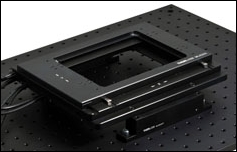
Click to Enlarge
MLS203-1 Stage Attached to a Breadboard with our MLSA01 Bracket Set
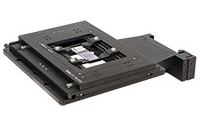
Click to Enlarge
MLS203-1 Stage with MLS203P2 Slide Holder on CSA1000 Fixed Arm for Attachment to a Cerna Microscope Body
(All Sold Separately)
We offer a choice of brackets to facilitate mounting the MLS203-1 stage to a range of upright and inverted microscopes from Thorlabs, Nikon, and Olympus. Please see the table below for specific compatibility. Each bracket (with the exception of the CSA1000) comes with instructions describing how to attach the stage to the microscope. Please note that the MLS203-2 stage can be bolted directly to a Zeiss Axio Observer or Axiovert without the need for brackets.
Additionally, there are two options for attaching an MLS203 stage to an imperial or metric breadboard to support home-built microscopes or general photonics applications. The MLSA01 Riser Plates, compatible with stage Item # MLS203-1, will raise the height of the stage by 1.24" (31.5 mm). The MLSA04 Adapter, compatible with stage Item #s MLS203-1 and MLS203-2, connects to the base of the stage, blocking the central aperture; however, it raises the height of the stage by only 0.03" (0.7 mm), making it well suited for height-limited applications.
| Click Image for Details |
 |
 |
 |
 |
 |
 |
 |
 |
 |
| Item # | CSA1000 | MLSA02 | MLSA09 | MLSA08 | MLSA03 | MLSA06 | MLSA07 | MLSA01 | MLSA04 |
| Stage Item # | MLS203-1 | MLS203-1 | MLS203-1 | MLS203-1 | MLS203-1 or MLS203-2 |
||||
| Microscope Brand | Thorlabs | Olympus | Nikon | Optical Breadboard, Custom Configurationa |
|||||
| Microscope Model | Cerna® |
IX51, IX71, IX73, IX81, IX83 |
IX70 | BX41, BX43, BX51, BX53, BX61 |
TE2000, Eclipse Ti |
50i, 80i, 90i, Ci-L |
Eclipse FN1 | N/A | |
| Microscope Type | Upright | Inverted | Inverted | Upright | Inverted | Upright | Upright | N/A | |
|
We support microscopes from Olympus, Nikon, Zeiss and Leica. Please contact Technical Support to inquire about bracket availability if your microscope model is not listed above. |

MLS203P2 Petri Dish/Slide Holder for Inverted Microscopes
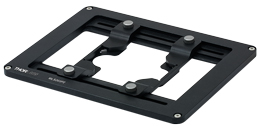
Click to Enlarge
- Compatible with Petri Dishes Measuring 30 mm to 60 mm (1.18" to 2.36") in Diameter
- Compatible with Glass Slides Measuring 25 mm to 26.5 mm (0.98" to 1.04") in Width
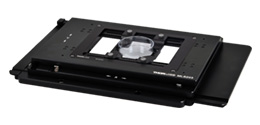
Click to Enlarge
MLS203 Stage with MLS203P2 Petri Dish/Slide Holder Fitted
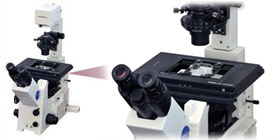
Click to Enlarge
MLS203 Stage with MLS203P2 Mounted on Inverted Microscope
C4SH01 Multi Slide Holder for Inverted Microscopes
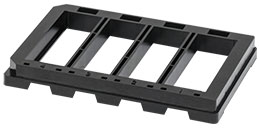
Click to Enlarge
- Plastic Holder Compatible with 25 mm x 75 mm,
1.1 ± 0.2 mm Thick Microscope Slides - Mount up to Four Slides for Automated Tissue and Tissue Microarray Analysis
- Same Footprint as Multiwell Plates (127.6 mm × 85.5 mm)
- Requires MLS203P1 Adapter Plate (Sold Below)
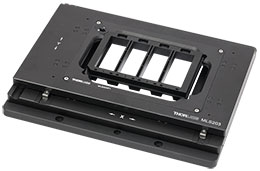
Click to Enlarge
MLS203 Stage with C4SH01 Slide Holder Tray (Requires the MLS203P1 Plate Adapter, Sold Below)
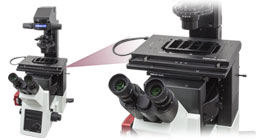
Click to Enlarge
MLS203 Stage with C4SH01 in an MLS203P1 Plate Adapter Mounted on Inverted Microscope
MLS203P10 Multi-Slide Holder for Upright or Inverted Microscopes
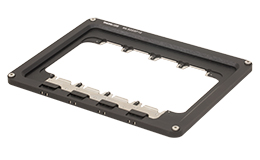
Click to Enlarge
- Compatible with 26 mm x 76.7 mm (Max) Microscope Slides
- Holds up to Four Slides
- Precise Spring-Loaded Slide Retention Mechanism
- Unobstructed Bidirectional Objective Access to Slides
- High Degree of Parallelism in XY Translation Plane
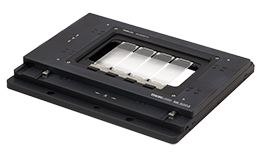
Click to Enlarge
MLS203 Stage with MLS203P10 Multi Slide Holder, Holding Four Slides
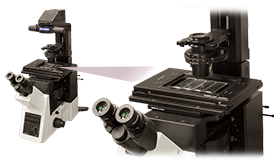
Click to Enlarge
MLS203 Stage with MLS203P10 Multi-Slide Holder Mounted on Inverted Microscope
MLS203P13 Multi-Slide Holder for Upright or Inverted Microscopes
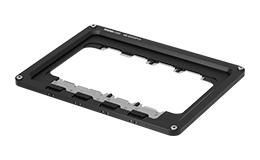
Click to Enlarge
- Compatible with One 54.5 mm x 76.7 mm (Max) Slide and Two 26 mm x 76.7 mm (Max) Microscope Slides
- Alternately Holds Four 26 mm x 76.7 mm (Max) Slides
- Precise Spring-Loaded Slide Retention Mechanism
- Unobstructed Bidirectional Objective Access to Slides
- High Degree of Parallelism in XY Translation Plane
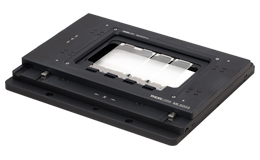
Click to Enlarge
MLS203 Stage with MLS203P13 Multi Slide Holder, Holding Three Slides
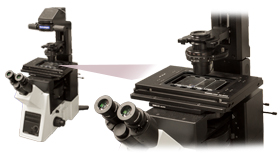
Click to Enlarge
MLS203 Stage with MLS203P13 Multi-Slide Holder Mounted on Inverted Microscope

These accessory plates can also be mounted on rigid stands for flexible positioning around the light path.
MLS203P1 Multiwell Plate Adapter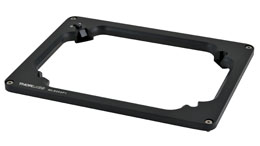
Click to Enlarge
- Compatible with C4SH01 and Standard Well Plates
- Clip Holder to Secure Samples in Place
MLS203P3 Blank Adapter Plate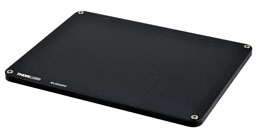
Click to Enlarge
- Ideal for Custom or Non-Standard Applications
- Easily Drilled and Tapped
MLS203P4 and MLS203P5 Breadboard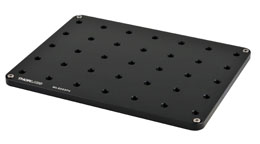
Click to Enlarge
- 35 Imperial or Metric Taps
- MLS203P4: M6 Taps on 25 mm Centers
- MLS203P5: 1/4"-20 Taps on 1" Centers
Application Example 1
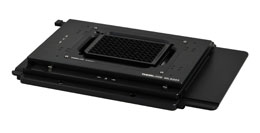
Click to Enlarge
MLS203 Stage with MLS203P1 Multiwell Plate Adapter Fitted
Application Example 2
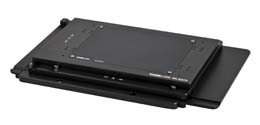
Click to Enlarge
MLS203 Stage with MLS203P3 Blank Adapter Plate Fitted
Application Example 3
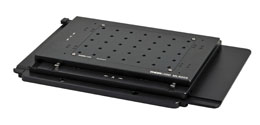
Click to Enlarge
MLS203 Stage with MLS203P4 Breadboard Fitted

- Ideal for use with MLS203 Stages
- High-Reliability Joysticks Utilizing USB HID Protocol
- 2-Axis Control Via a Joystick Knob
- Two Different Modes for Fast or High Precision Moves
- Speed Dial for Sensitivity Adjustment
- Allows Remote Manual Control
- Can be Reprogrammed using a PC
- Ergonomic Design
The MJC2 Joystick Console has been designed for microscope users and provides intuitive, tactile, manual positioning of the MLS203 Stages and other XY translation stages. The console features a two-axis joystick for XY control. In most applications, the default parameter settings saved within the controller allow the joystick to be used out-of-the-box, with no need for further setup, thereby negating the requirement to be connected to a host PC and allowing true remote operation. Parameter settings can also be reprogrammed and saved to a paired controller using a PC, allowing the controller to be disconnected from the computer and remote operation continued.
The MJC2 Joystick is compatible with our Benchtop Brushless DC Servo Controllers, Rack-Mounted Brushless DC Servo Controller, Rack-Mounted Brushless DC Servo Control Module, and Stepper Motor Controllers. The joystick has both a Mini-DIN and a USB Type-C port and is shipped complete with two cables, a 6-pin Mini-DIN plug to plug cable and a USB 3.1 Type-A to Type-C cable, for use with these controllers as well as setups utilizing the USB HID class. For more information about configuring and setting up the joystick over USB HID, please see the manual by clicking on the red Docs icon (![]() ) below. If you intend to use the joystick with a legacy BBD10x series unit, please contact Tech Support for a compatible cable.
) below. If you intend to use the joystick with a legacy BBD10x series unit, please contact Tech Support for a compatible cable.
 Products Home
Products Home





















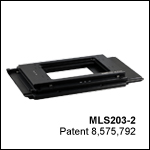
 Zoom
Zoom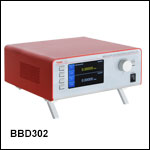
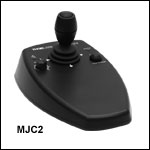
 High-Speed, Low-Profile XY Microscopy Stage
High-Speed, Low-Profile XY Microscopy Stage